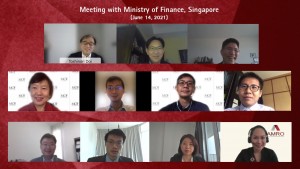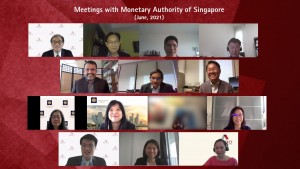SINGAPORE, June 21, 2021 – Singapore’s economy is expected to rebound strongly in 2021 after a sharp contraction last year due to the COVID-19 pandemic. Skillful crisis management and effective policy measures supported the economy and labor market, minimizing economic scarring. This is according to the preliminary assessment by the ASEAN+3 Macroeconomic Research Office (AMRO) after its virtual Annual Consultation with the Singaporean authorities from May 17 to June 18, 2021.
The AMRO team was led by Lead Economist, Dr. Chaipat Poonpatpibul. AMRO Director, Mr. Toshinori Doi, and Chief Economist, Dr. Hoe Ee Khor participated in the policy meetings. The discussions focused on the pandemic’s impact on the economy, policy support, and measures to address the challenges in the post-pandemic new normal.
Economic outlook
“The Singapore economy is expected to turnaround and grow by 6.1 percent in 2021, following a 5.4 percent contraction last year,” said Dr. Poonpatpibul. “The swift, sizeable, and more targeted policy measures have effectively cushioned the impact of the pandemic and supported the recovery. Further support would be needed if the recovery falters due to a resurgence in local and overseas infections.”
Despite a strong rebound, the economic outlook is uncertain, with an uneven recovery across sectors. Benefiting from the global recovery and robust electronics demand, the manufacturing sector is expected to grow strongly. The recovery in tourism-related sectors will remain slow due to the ongoing pandemic containment measures and slow pace of vaccination in most countries.
The labor market improved steadily after being severely impacted by the stringent containment measures last year. Meanwhile, inflation has turned positive and is expected to rise moderately in 2021.
The tightened precautionary measures to contain an uptick in local transmission in May and June 2021 have helped to avoid the need for a more stringent lockdown, which could derail the economic recovery. The increased support to adversely affected services sectors during this period has mitigated the impact on them.
Risks and vulnerabilities
In the short term, the key risks to growth are renewed waves of infections in Singapore and abroad, and delays in vaccine rollouts. These risks could trigger lockdowns, further hampering the restart of international travel, and dampening consumption and investment activities.
While Singapore’s financial sector has remained resilient throughout the crisis, rising financial distress among more vulnerable businesses in Singapore and other countries in the region may lead to a deterioration in banks’ asset quality. But pre-emptive efforts by banks to shore up their loan loss provisions and strong capital buffers are expected to mitigate the rising credit risk.
Furthermore, the magnitude of economic scarring as well as the recovery prospects of the hard-hit travel and tourism sectors remain uncertain.
Over the longer term, a rapidly aging population places upward pressure on fiscal spending in healthcare and social welfare services. The challenges posed by climate change will also be considerable, requiring large fiscal and financial resources to mitigate physical and transition risks.
Policy recommendations
With most sectors improving steadily, policy support is shifting from broad-based crisis response to a more targeted one. The phased withdrawal of fiscal policy support is appropriate. Nonetheless, ongoing support for hard-hit sectors is necessary to minimize scarring effects and to enable viable businesses to pick up the pace. As Singapore’s fiscal policy space remains ample, the authorities are encouraged to remain flexible and be prepared to extend further support if the recovery loses momentum. Efforts on job creation and reskilling of displaced workers are commendable and should continue.
The accommodative monetary policy stance should be maintained in view of the continuing uncertainties in the outlook, and low inflationary pressures. Monetary policy should remain accommodative to complement fiscal policy until recovery is entrenched.
Singapore’s debt relief, credit support, and bank regulatory easing measures have helped households and businesses while safeguarding financial stability. A gradual exit from the broad-based debt relief scheme is appropriate, in line with the steady recovery in most sectors. An extension of debt relief should be considered for hard-hit but still viable businesses.
The tight macroprudential policy stance should be maintained against a steady rise in house prices.
The ongoing review of Singapore’s structural transformation plans is essential for further efforts to strengthen productivity and firms’ competitiveness in the post COVID-19 era. Efforts to promote FinTech, digital banking, cross-border retail payments, and other modern services sectors are laudable.
As a financial hub, Singapore is well-positioned to support the region’s climate finance needs.
The AMRO team would like to express its gratitude to the Singaporean authorities and other participating organizations for their cooperation and candid exchange of views. AMRO wishes to express its appreciation for the strong support from the authorities and the excellent arrangement that has made this virtual mission possible.

Top Row (from L to R): AMRO Director Toshinori Doi, AMRO Chief Economist Khor Hoe Ee, AMRO Lead Economist Chaipat Poonpatpibul
Middle Row (from L to R): Permanent Secretary of Singapore Ministry of Finance Tan Ching Yee, Deputy Secretary (Planning) of Singapore Ministry of Finance Yee Ping Yi, Director (International) of Singapore Ministry of Finance Alvin Lim, Deputy Director (International) of Singapore Ministry of Finance Ian Wong
Bottom Row (from L to R): AMRO Senior Economist Yang-Hyeon Yang, AMRO Economist Justin Lim, AMRO Economist Catharine Kho, AMRO Research Data Analyst Madeleine Vinuya

Top Row (from L to R): AMRO Director Toshinori Doi, AMRO Chief Economist Khor Hoe Ee, AMRO Lead Economist Chaipat Poonpatpibul, AMRO Senior Economist Yang-Hyeon Yang
Second Row (from L to R): MAS Managing Director Ravi Menon, MAS Deputy Managing Director (Economic Policy) and Chief Economist Edward Robinson, MAS Deputy Managing Director (Markets and Development) Mr Leong Sing Chiong
Bottom Row (from L to R): AMRO Economist Justin Lim, AMRO Economist Catharine Kho, AMRO Research Data Analyst Madeleine Vinuya
About AMRO
The ASEAN+3 Macroeconomic Research Office (AMRO) is an international organization established to contribute towards securing macroeconomic and financial stability of the ASEAN+3 region, comprising 10 members of the Association of Southeast Asian Nations (ASEAN) and China; Hong Kong, China; Japan; and Korea. AMRO’s mandate is to conduct macroeconomic surveillance, support the implementation of the regional financial arrangement, the Chiang Mai Initiative Multilateralisation (CMIM), and provide technical assistance to the members.
